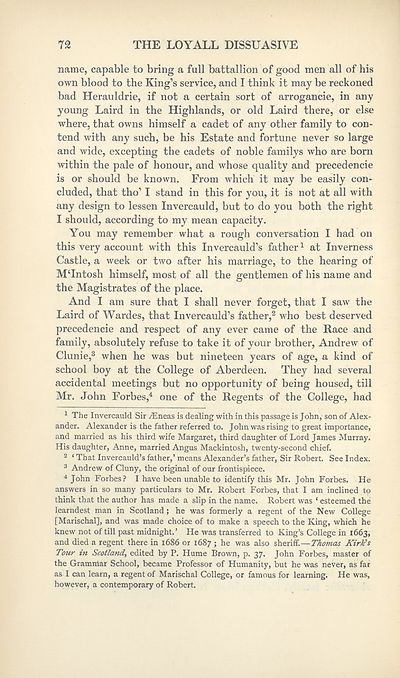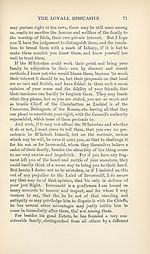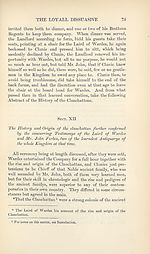Series 1 > Loyall dissuasive
(191) Page 72
Download files
Complete book:
Individual page:
Thumbnail gallery: Grid view | List view

72
THE LOYALL DISSUASIVE
name, capable to bring a full battallion of good men all of his
own blood to the King’s service, and I think it may be reckoned
bad Herauldrie, if not a certain sort of arrogancie, in any
young Laird in the Highlands, or old Laird there, or else
where, that owns himself a cadet of any other family to con¬
tend with any such, be his Estate and fortune never so large
and wide, excepting the cadets of noble familys who are born
within the pale of honour, and whose quality and precedencie
is or should be known. From which it may be easily con¬
cluded, that tho’ I stand in this for you, it is not at all with
any design to lessen Invercauld, but to do you both the right
I should, according to my mean capacity.
You may remember what a rough conversation I had on
this vex*y account with this Invercauld’s father1 at Inverness
Castle, a week or two after his marriage, to the hearing of
MTntosh himself, most of all the gentlemen of his name and
the Magistrates of the place.
And I am sure that I shall never forget, that I saw the
Laird of Wardes, that Invercauld’s father,2 who best deserved
precedencie and respect of any ever came of the Race and
family, absolutely refuse to take it of your brother, Andrew of
Clunie,3 when he was but nineteen years of age, a kind of
school boy at the College of Aberdeen. They had several
accidental meetings but no opportunity of being housed, till
Mr. John Forbes,4 one of the Regents of the College, had
1 The Invercauld Sir tineas is dealing with in this passage is John, son of Alex¬
ander. Alexander is the father referred to. John was rising to great importance,
and married as his third wife Margaret, third daughter of Lord James Murray.
His daughter, Anne, married Angus Mackintosh, twenty-second chief.
2 ‘ That Invercauld’s father,’ means Alexander’s father, Sir Robert. See Index.
3 Andrew of Cluny, the original of our frontispiece.
4 John Forbes? I have been unable to identify this Mr. John Forbes. He
answers in so many particulars to Mr. Robert Forbes, that I am inclined to
think that the author has made a slip in the name. Robert was ‘ esteemed the
learndest man in Scotland; he was formerly a regent of the New College
[Marischal], and was made choice of to make a speech to the King, which he
knew not of till past midnight.’ He was transferred to King’s College in 1663,
and died a regent there in 1686 or 1687 ; he was also sheriff.—Thomas Kirk's
Tour in Scotland, edited by P. Hume Brown, p. 37. John Forbes, master of
the Gramiriar School, became Professor of Humanity, but he was never, as far
as I can learn, a regent of Marischal College, or famous for learning. He was,
however, a contemporary of Robert.
THE LOYALL DISSUASIVE
name, capable to bring a full battallion of good men all of his
own blood to the King’s service, and I think it may be reckoned
bad Herauldrie, if not a certain sort of arrogancie, in any
young Laird in the Highlands, or old Laird there, or else
where, that owns himself a cadet of any other family to con¬
tend with any such, be his Estate and fortune never so large
and wide, excepting the cadets of noble familys who are born
within the pale of honour, and whose quality and precedencie
is or should be known. From which it may be easily con¬
cluded, that tho’ I stand in this for you, it is not at all with
any design to lessen Invercauld, but to do you both the right
I should, according to my mean capacity.
You may remember what a rough conversation I had on
this vex*y account with this Invercauld’s father1 at Inverness
Castle, a week or two after his marriage, to the hearing of
MTntosh himself, most of all the gentlemen of his name and
the Magistrates of the place.
And I am sure that I shall never forget, that I saw the
Laird of Wardes, that Invercauld’s father,2 who best deserved
precedencie and respect of any ever came of the Race and
family, absolutely refuse to take it of your brother, Andrew of
Clunie,3 when he was but nineteen years of age, a kind of
school boy at the College of Aberdeen. They had several
accidental meetings but no opportunity of being housed, till
Mr. John Forbes,4 one of the Regents of the College, had
1 The Invercauld Sir tineas is dealing with in this passage is John, son of Alex¬
ander. Alexander is the father referred to. John was rising to great importance,
and married as his third wife Margaret, third daughter of Lord James Murray.
His daughter, Anne, married Angus Mackintosh, twenty-second chief.
2 ‘ That Invercauld’s father,’ means Alexander’s father, Sir Robert. See Index.
3 Andrew of Cluny, the original of our frontispiece.
4 John Forbes? I have been unable to identify this Mr. John Forbes. He
answers in so many particulars to Mr. Robert Forbes, that I am inclined to
think that the author has made a slip in the name. Robert was ‘ esteemed the
learndest man in Scotland; he was formerly a regent of the New College
[Marischal], and was made choice of to make a speech to the King, which he
knew not of till past midnight.’ He was transferred to King’s College in 1663,
and died a regent there in 1686 or 1687 ; he was also sheriff.—Thomas Kirk's
Tour in Scotland, edited by P. Hume Brown, p. 37. John Forbes, master of
the Gramiriar School, became Professor of Humanity, but he was never, as far
as I can learn, a regent of Marischal College, or famous for learning. He was,
however, a contemporary of Robert.
Set display mode to:
![]() Universal Viewer |
Universal Viewer | ![]() Mirador |
Large image | Transcription
Mirador |
Large image | Transcription
Images and transcriptions on this page, including medium image downloads, may be used under the Creative Commons Attribution 4.0 International Licence unless otherwise stated. ![]()
| Scottish History Society volumes > Series 1 > Loyall dissuasive > (191) Page 72 |
|---|
| Permanent URL | https://digital.nls.uk/127549297 |
|---|
| Attribution and copyright: |
|
|---|
| Description | Over 180 volumes, published by the Scottish History Society, containing original sources on Scotland's history and people. With a wide range of subjects, the books collectively cover all periods from the 12th to 20th centuries, and reflect changing trends in Scottish history. Sources are accompanied by scholarly interpretation, references and bibliographies. Volumes are usually published annually, and more digitised volumes will be added as they become available. |
|---|


